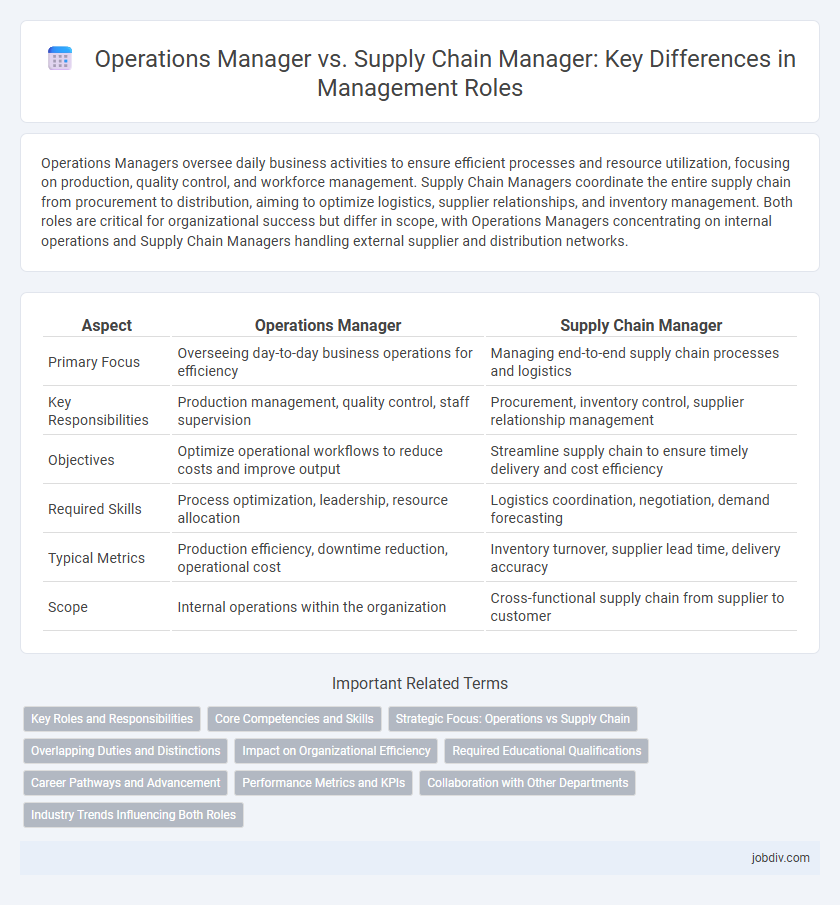Operations Managers oversee daily business activities to ensure efficient processes and resource utilization, focusing on production, quality control, and workforce management. Supply Chain Managers coordinate the entire supply chain from procurement to distribution, aiming to optimize logistics, supplier relationships, and inventory management. Both roles are critical for organizational success but differ in scope, with Operations Managers concentrating on internal operations and Supply Chain Managers handling external supplier and distribution networks.
Table of Comparison
| Aspect | Operations Manager | Supply Chain Manager |
|---|---|---|
| Primary Focus | Overseeing day-to-day business operations for efficiency | Managing end-to-end supply chain processes and logistics |
| Key Responsibilities | Production management, quality control, staff supervision | Procurement, inventory control, supplier relationship management |
| Objectives | Optimize operational workflows to reduce costs and improve output | Streamline supply chain to ensure timely delivery and cost efficiency |
| Required Skills | Process optimization, leadership, resource allocation | Logistics coordination, negotiation, demand forecasting |
| Typical Metrics | Production efficiency, downtime reduction, operational cost | Inventory turnover, supplier lead time, delivery accuracy |
| Scope | Internal operations within the organization | Cross-functional supply chain from supplier to customer |
Key Roles and Responsibilities
Operations Managers oversee day-to-day business activities, ensuring efficient processes, resource allocation, and quality control across departments. Supply Chain Managers focus on managing the end-to-end supply chain, including procurement, logistics, inventory management, and supplier relationships to optimize cost and delivery performance. Both roles require strategic planning and coordination but differ in scope, with Operations Managers emphasizing internal efficiency and Supply Chain Managers concentrating on external supplier and distribution networks.
Core Competencies and Skills
Operations Managers excel in process optimization, resource allocation, and quality control to ensure efficient production workflows. Supply Chain Managers specialize in logistics coordination, vendor relationship management, and inventory optimization to maintain seamless product flow from suppliers to customers. Both roles require strong analytical skills, leadership, and proficiency in supply chain software, but Operations Managers focus more on internal operations while Supply Chain Managers emphasize external supplier and distribution network management.
Strategic Focus: Operations vs Supply Chain
Operations Managers concentrate on optimizing internal processes, resource allocation, and production efficiency to meet organizational goals effectively. Supply Chain Managers emphasize managing the flow of goods, information, and finances across the entire supply chain network, including suppliers, manufacturers, and distributors. Strategic focus for Operations Managers lies in enhancing operational performance, while Supply Chain Managers prioritize end-to-end supply chain integration and risk mitigation.
Overlapping Duties and Distinctions
Operations Managers oversee daily business activities ensuring efficient production and service delivery, while Supply Chain Managers specialize in coordinating logistics, procurement, and inventory management to optimize the flow of goods. Both roles require strategic planning, process improvement, and cross-department collaboration, but Operations Managers focus more on internal workflow, whereas Supply Chain Managers handle external supplier relationships and distribution networks. Understanding these overlapping duties and distinctions enhances organizational efficiency and supply chain resilience.
Impact on Organizational Efficiency
Operations Managers drive organizational efficiency by streamlining internal processes, optimizing resource allocation, and enhancing production workflows, directly impacting cost reduction and quality improvement. Supply Chain Managers improve efficiency by managing end-to-end logistics, supplier relationships, and inventory control, ensuring timely delivery and minimizing disruptions across the supply network. Both roles collaboratively contribute to overall operational excellence by aligning internal operations with external supply chain dynamics.
Required Educational Qualifications
Operations Managers typically require a bachelor's degree in business administration, management, or industrial engineering, while Supply Chain Managers often hold degrees in supply chain management, logistics, or operations research. Advanced certifications such as APICS Certified Supply Chain Professional (CSCP) or Six Sigma Green Belt can enhance qualifications for both roles. Employers may prefer candidates with MBA degrees or relevant work experience to handle complex operational and supply chain challenges effectively.
Career Pathways and Advancement
Operations Managers typically advance by gaining cross-functional expertise in production, quality control, and project management, often moving into senior operations or general management roles. Supply Chain Managers progress by specializing in logistics, procurement, and demand forecasting, leading to roles such as director of supply chain or chief supply chain officer. Both career pathways benefit from certifications like APICS CPIM or Six Sigma, enhancing leadership opportunities and strategic responsibility.
Performance Metrics and KPIs
Operations Managers emphasize performance metrics such as production efficiency, quality control rates, and cost per unit to optimize internal processes and ensure operational excellence. Supply Chain Managers focus on KPIs including inventory turnover, order fulfillment cycle time, and supplier performance to enhance the flow of goods from suppliers to customers. Both roles leverage data-driven insights, but Operations Managers prioritize internal process improvements while Supply Chain Managers concentrate on external logistics and supplier coordination.
Collaboration with Other Departments
Operations Managers drive collaboration by coordinating activities across production, quality, and customer service teams to optimize workflows and enhance operational efficiency. Supply Chain Managers work closely with procurement, logistics, and inventory departments to ensure seamless material flow and reduce supply chain disruptions. Both roles emphasize cross-functional teamwork to achieve organizational goals and maintain competitive advantage.
Industry Trends Influencing Both Roles
Industry trends such as digital transformation, automation, and data analytics are reshaping the responsibilities of Operations Managers and Supply Chain Managers by enhancing efficiency and decision-making processes. The rise of sustainable practices and global sourcing pressures requires both roles to prioritize environmental impact and risk mitigation strategies. Increased demand for real-time visibility and agility in supply networks drives the integration of IoT and AI technologies, fundamentally altering operational workflows and supply chain management.
Operations Manager vs Supply Chain Manager Infographic

 jobdiv.com
jobdiv.com